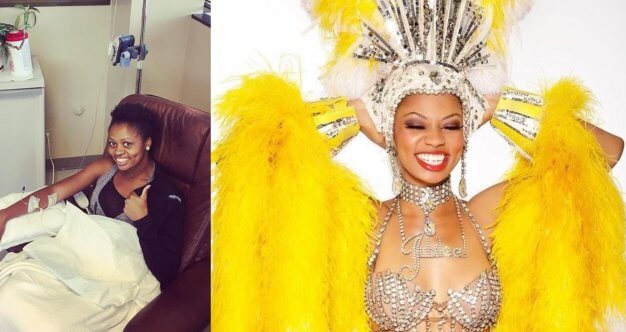Glamorous showgirls, a live big band, singing, dancing, and triple negative breast cancer. That’s been 33-year-old Lauren Clark’s life for the last four years. Scroll through Lauren Clark’s Instagram account and you’ll find a colorful collection of feathers, shimmers, boas, and leotards. Clark is a Las Vegas showgirl, and she looks the part to a tee. She’s a part of the dance ensemble “Vegas! The Show,” and has been dancing since age four.
She’s also an extraordinary breast cancer survivor. According to the Las Vegas Review-Journal, Clark was diagnosed with triple-negative breast cancer when she was only 29 years old. This is quite unusual; only 7 percent of women in the U.S. diagnosed with breast cancer are under age 40 — and that number drops to one percent under the age of 30.
Read MoreView this post on Instagram
Because most women with breast cancer are diagnosed at an older age, Clark initially didn’t think much of the lump in her breast, assuming that at the worst, it could be a cyst. But as the Review-Journal reports, after a biopsy revealed that the lump was actually triple-negative breast cancer, she went in for a surgery called a lumpectomy right away. Four months later, once she was deep into treatment with chemotherapy, Clark would post a selfie on Instagram with the caption, “If they told you you were too young, they lied!”At Clark’s Age, Fertility Was A Major Concern
Chemotherapy drugs can affect a woman’s ability to have children. As Dr. Jamie Knopman, Director of Fertility Preservation at the Colorado Center for Reproductive Medicine in New York told SurvivorNet, different chemo agents can vary in terms of their effect on fertility, but most will have some effect, making it a good idea to talk to your doctor about fertility preservation options.
What to Know About Preserving Fertility During Cancer
- Can I Have A Baby After Breast Cancer?
- Preserving Fertility During Cancer Treatment: What Are the Options?
- Freezing Eggs Or Embryos: What Should I Do?
- When Chemotherapy Damages the Ovaries: What are the Options?
- After A Cancer Diagnosis: Getting Fertility Hormone Injections
- How Does Chemotherapy Affect Fertility?
- Fertility Preservation After a Cancer Diagnosis
At only 29 years old — and as determined to survive her cancer as she was — Clark made the decision to freeze her eggs before going in for chemotherapy treatment. But unfortunately, shortly after the decision, Clark learned that egg freezing wasn’t covered by her insurance and would cost a total of $15,000, according to the Review-Journal.
View this post on Instagram
Last injection! ???? extraction in 36 hours! #IVF #breastcancer #tnbc #fight ????
That’s when she turned to GoFundMe to afford it, and supporters — many of whom were strangers to Clark, but were a part of the Las Vegas show community — pulled through and helped Clark afford the treatment before beginning what would become six rounds of chemotherapy.After Genetic Testing, a Double Mastectomy
After her breast cancer diagnosis, Clark underwent genetic testing and learned that she had a mutation of her BRCA 2 gene, which meant that she faced a significantly increased risk of her breast cancer recurring (coming back) as well as the risk that she would develop additional cancers, including ovarian cancer. The discovery of the mutation encouraged Clark to get a double mastectomy to remove both of her breasts. She has also decided to have a surgery to remove her ovaries before age 37 (after she’s had the chance to have children).
View this post on Instagram
Dancing Through Cancer
Clark is now cancer-free and is fully back in the show biz — but even in during the toughest moments of her cancer battle, she never really left dancing to begin with. During treatment, Clark told the Review-Journal, she had another dancer who would fill her spot in the performances whenever she needed it. But when she was feeling well enough, she’d dance her heart out.
View this post on Instagram
“The show was so awesome and so supportive with me doing that," Clark told the Review-Journal. "Because it really helped me emotionally to be able to come here… It was something I needed to do for my own sanity."#FeelItOnTheFirst — The Importance of Self Exams
Now, the first day of every month, Clark posts a selfie to her Instagram account with a hand over one of her breasts (which were reconstructed after her double mastectomy.) She captions each selfie with the hashtag “#FeelItOnTheFirst, encouraging her friends and followers to give themselves routine breast self-exams, and to pay attention to their bodies.
“If you find anything, don't be scared of it,” Clark told the Review-Journal. “Get it checked. Don't let it linger. Don't be afraid of it. Go get it checked.”
Learn more about SurvivorNet's rigorous medical review process.


